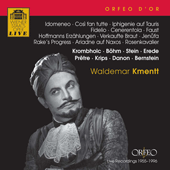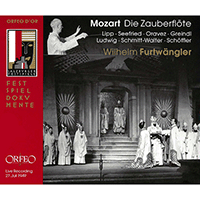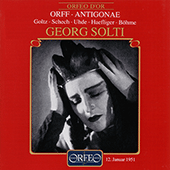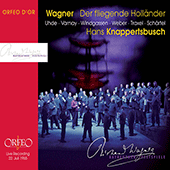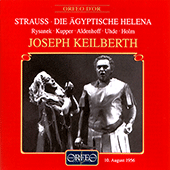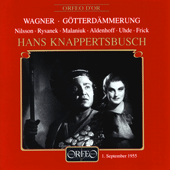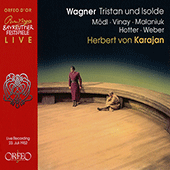Hermann Uhde
Uhde, whose mother was American and a vocal student of the distinguished baritone Karl Scheidemantel, initially trained as a bass, studying in Bremen with Philipp Krauss, himself a baritone and a significant local musical influence. He made his operatic stage debut at the Stadttheater Bremen in 1936 as Titurel / Parsifal and after two years at Bremen moved to the Stadttheater in Freiburg im Breisgau where he sang from 1938 to 1940.
From 1940 to 1942 Uhde was a member of the Bavarian State Opera in Munich, after which he sang from 1942 to 1944 at the German Theatre in The Hague in occupied Holland; here he began to sing baritone parts. Towards the end of World War II he was drafted into the German army, becoming a prisoner of war between April 1945 and February 1946. He joined the Hanover Opera in 1947 and sang there for a year before moving to the Hamburg State Opera, where he was based from 1948 to 1950.
At the 1949 Salzburg Festival Uhde created the part of Kreon in the world premiere of Carl Orff’s opera Antigone, also singing there the following year in Britten’s The Rape of Lucretia. He was a member of the Vienna State Opera for the 1950–1951 season, before returning to the Bavarian State Opera, where he remained for five seasons from 1951 to 1956. Uhde made his debut at the Bayreuth Festival in 1951 and returned regularly until 1960; his roles there included Klingsor / Parsifal (1951–1953), Gunther / Götterdämmerung (1951–1957), Melot / Tristan und Isolde (1952), Wotan / Der Ring des Nibelungen (1952, 1960), Telramund / Lohengrin (1953–1954) and Donner / Das Rheingold (1953).
When the Bavarian State Opera visited London to perform at the Royal Opera House, Uhde made a major impression as Mandryka / Arabella, subsequently returning to Covent Garden as Telramund (1953), Gunther (1953, 1956, 1957, 1959, 1960), the four villains / Les Contes d’Hoffmann (1954) and Wotan / Das Rheingold (1960). Having made his American debut with the Metropolitan Opera, New York in November 1955, singing Telramund, he sang with the Met during six seasons, (1955–1957, 1958–1961, 1963–1964), tackling a range of roles in both the German and Italian repertoires that included Telramund, Wotan / Das Rheingold and Die Walküre, Gunther, the Grand Inquisitor / Don Carlo, Amfortas / Parsifal and Klingsor (all 1957), the title role in Wozzeck (Met premiere, in English, 1959), Don Pizarro / Fidelio (1960), Scarpia / Tosca (‘the most gripping artist I have seen in this role’—Musical America), (both 1960), Melot and Orest / Elektra (both 1961). He made his debut at the Paris Opera in 1959 singing the Wanderer / Siegfried.
Having left Munich for a season with the Stuttgart Opera (1956–1957) before rejoining the Vienna State Opera, Uhde stayed in Vienna until 1961, when he joined the Deutsche Oper, Berlin. Contemporary press reports suggest that he was experiencing vocal difficulties at the top of his voice at his final Met performances in 1964, and he collapsed on stage and died of a heart attack in 1965 at the Royal Opera House, Copenhagen, where he was singing the title role in Niels Viggo Bentzon’s opera Faust III, a part which he had created during the previous year at Kiel.
The colour of Uhde’s voice was unusually dark: this, allied to his powerful dramatic capability, both vocally and physically, made him the pre-eminent exponent of the Wagner villain roles, such as Telramund and Gunther, during the 1950s and early 1960s, as well as of other tormented characters such as Amfortas and the title part in Der fliegende Holländer.
© Naxos Rights International Ltd. — David Patmore (A–Z of Singers, Naxos 8.558097-100).








